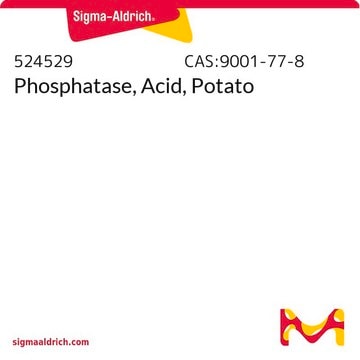P1435
Phosphatase, Acid from sweet potato
ammonium sulfate suspension, ≥10.0 units/mg protein (modified Warburg-Christian)
Synonym(s):
(Orthophosphoric-monoester phosphohydrolase [acid optimum] )
About This Item
Recommended Products
form
ammonium sulfate suspension
specific activity
≥10.0 units/mg protein (modified Warburg-Christian)
secondary activity
≤9.9 units/mg protein ATPase
mol wt
110 kDa
storage temp.
2-8°C
InChI
1S/C6H10O2/c1-3-4-8-5-6(2)7/h1,6-7H,4-5H2,2H3
InChI key
GZCWLCBFPRFLKL-UHFFFAOYSA-N
General description
Application
Biochem/physiol Actions
Unit Definition
Physical form
Signal Word
Danger
Hazard Statements
Precautionary Statements
Hazard Classifications
Resp. Sens. 1
Storage Class Code
10 - Combustible liquids
WGK
WGK 3
Flash Point(F)
Not applicable
Flash Point(C)
Not applicable
Personal Protective Equipment
Certificates of Analysis (COA)
Search for Certificates of Analysis (COA) by entering the products Lot/Batch Number. Lot and Batch Numbers can be found on a product’s label following the words ‘Lot’ or ‘Batch’.
Already Own This Product?
Find documentation for the products that you have recently purchased in the Document Library.
Customers Also Viewed
Articles
Instructions for working with enzymes supplied as ammonium sulfate suspensions
Protocols
Enzymatic Assay of Acid Phosphatase (EC 3.1.3.2)
Our team of scientists has experience in all areas of research including Life Science, Material Science, Chemical Synthesis, Chromatography, Analytical and many others.
Contact Technical Service










